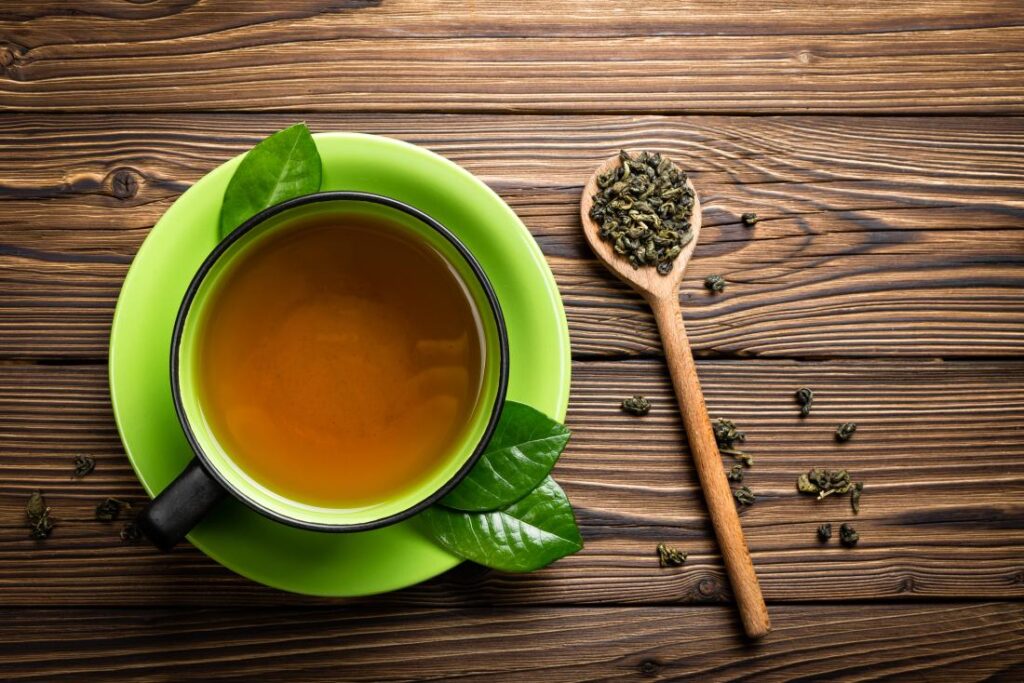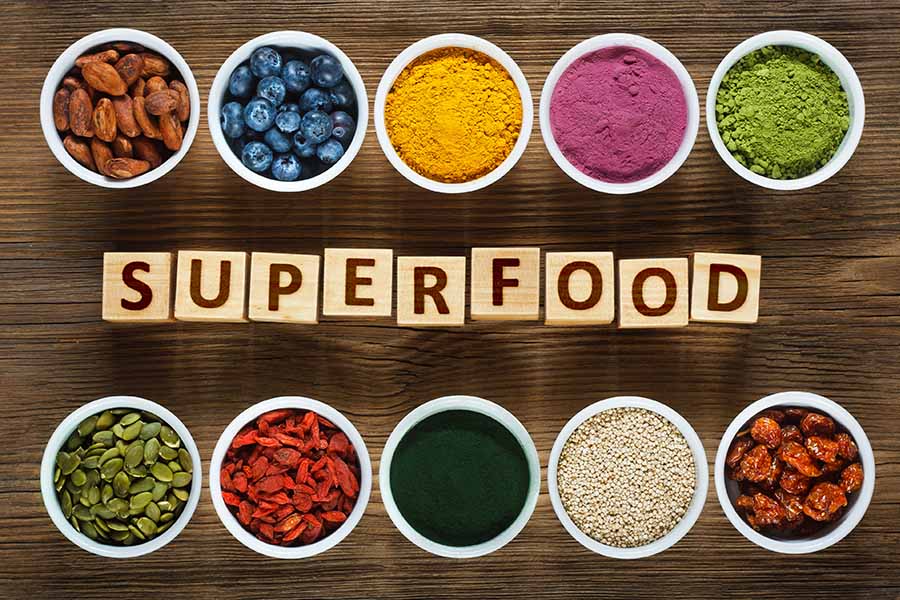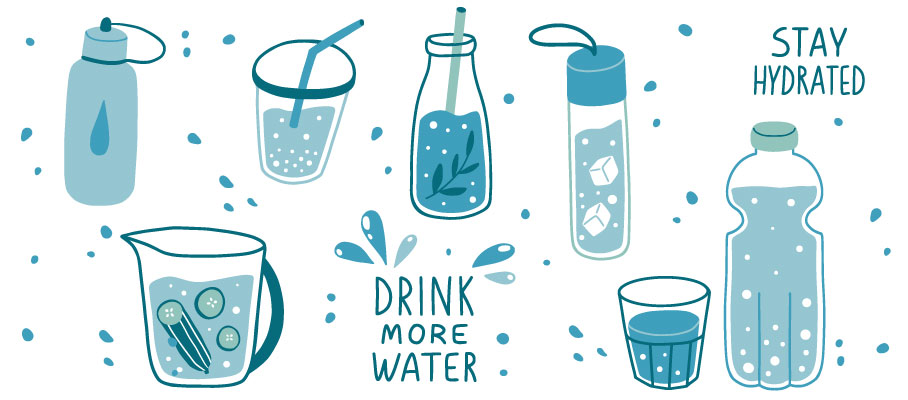If you ask five nutrition experts to give you a list of their favourite “superfoods,” you’ll get a variety of answers—but they’ll also overlap. The reason for this is that each food gives something unique and beneficial to your health.
One of the foods on the list may be high in protein or fibre, but it may be deficient in some vitamins and minerals. Another superfood might be high in disease-fighting antioxidants but lacking in protein.
The greatest method to ensure good health is to consume a wide variety of “power meals.” If you eat the meals listed below every day, you’ll be able to check off almost all of the nutritional boxes.
1. Blueberries – Top Antioxidant
Blueberries had more antioxidants than nearly 40 of its competitors in a study of popular fruits and vegetables. This puts the humble berry at the top of the list when it comes to preventing cancer, heart disease, dementia, and macular degeneration.

The antioxidant epicatechins in blueberries help protect against urinary tract infections. Epicatechins help germs stay away from the bladder wall. Blueberries are also abundant in water, which hydrates the body’s skin and cells. One fruit serving per day is satisfied by eating half a cup of blueberries.
2. Oats – Fiber Intake
Oats are high in soluble fibre, which has been associated to reduce blood pressure and cholesterol levels overall. Oats are a good source of glucose and beta-glucan. Beta-glucan is a soluble fibre that helps to manage blood sugar levels by slowing the digestion of sugar.

Oats are also high in plant protein, which aids in muscle growth and repair. Oatmeal has a staggering 10 grammes per half-cup portion, and several studies have shown that consuming it can lower your risk of heart disease. A bowl of oats can jumpstart your day and your body, and it’s also a great pre- or post-workout meal.
3. Apple – An Apple a Day Keeps the Doctor Away
The adage “one apple a day keeps the doctor away” may truly be true. Apples are high in the antioxidants quercetin and catechin, which protect our cells and assist to lower cancer and heart disease risk.

The apple and its skin contain more fibre than many other fruits, which can aid weight loss by increasing satiety. In addition to the numerous antioxidant health benefits, apples taste great, are satisfying, and give energy.
Note: Eating the skin provides extra fibre and minerals.
4. Green Tea- Boosts Your Metabolism
Green tea is chock-full of anti-oxidants. It has been established that its antioxidant levels are higher than those found in fruits and vegetables. Green tea is high in catechin, an antioxidant that has been found to assist the body avoid cell damage. Catechin is thought to help the body reduce inflammation, which is linked to sickness and illness. This potent antioxidant has been demonstrated to lower blood pressure and lower the risk of cardiovascular disease.

Green tea has also been shown to aid in the prevention of plaque development, which is associated to Alzheimer’s disease. Increased metabolism for weight loss is another health benefit. High tea has never tasted so good—just remember to keep it green.
5. Flaxseeds – reduce inflammation.
Flaxseeds are high in alpha-linolenic acid and are a good source of fibre. The important fatty acid alpha-linolenic acid has been found to lessen inflammation in the body. Lignans, a type of plant chemical known as polyphenols, are also found in flaxseeds. Certain hormone-related malignancies are less common as a result of these precursors.

Other anti-inflammatory characteristics of flax seeds have been found to be beneficial in the treatment of acne and asthma, according to studies. Ground flax is a good source of fibre that can aid with digestive issues. Flaxseed is nutrient-dense and high in omega-3 fatty acids. Flax is a remarkable “superfood” that is high in minerals, fatty acids, and protein.
6. Yogurt – Improve gut bacteria.
Probiotics, or live beneficial bacteria, are found in yoghurt. Yogurt has been demonstrated to inhibit the growth of dangerous bacteria in the intestine. It can also strengthen the immune system by assisting in the maintenance of stable ph levels in the body. Probiotics may aid with vaginal yeast infections, inflammatory bowel disease, ulcers, and urinary tract infections, according to certain studies.

Probiotics are only advised for persons with ulcerative colitis or irritable bowel syndrome in clinical trials, according to the American Gastroenterological Association’s clinical practise guidelines issued in 2020. Yogurt is also high in calcium and protein, both of which are beneficial to bone health. Yogurts aren’t all made equal. To guarantee that it contains probiotics, look for the phrase “live and active cultures” on the label. Plain yoghurt is also preferred over sugared variations.
7. Broccoli – Antioxidants.
Broccoli, a cruciferous vegetable, provides one of the most potent antioxidants available in our diet. Broccoli is high on the list of superfoods because it protects our bodies against cancer.

Broccoli has a great nutritious value while being low in calories. It’s the most nutrient-dense of these “superfood” vegetables. Broccoli also provides nutrients that enhance immunological and cardiovascular health, bone development, and the prevention of birth abnormalities.
8. Olive – Heart Health
Olive oil is a nutritious dietary fat that has been demonstrated to lower the risk of heart disease. Monounsaturated fatty acids are the major fat present in olive oil (MUFAs). MUFAs have been demonstrated to reduce total cholesterol and aid in blood clotting stability.

Olive oil has been related to improved blood sugar control and decreased insulin levels. Those with type 2 diabetes have demonstrated to benefit greatly from research. Olive oil is also high in antioxidants known as phenols, which have been related to preventing cholesterol buildup in arterial walls. For the best nutritional benefit, look for virgin, “extra-virgin,” or “cold-pressed” olive oils. To gain the heart-healthy advantages, one tablespoon is advised everyday.
9. Beans – Brain Food
Beans are a terrific source of soluble fibre and carbohydrate to eat on a regular basis. Soluble fibre protects the heart by absorbing cholesterol before it reaches the arterial wall. The cholesterol is then excreted by the body’s natural processes. According to studies, consuming a diet high in soluble fibre lowers total cholesterol by 10% to 15% and is connected to a lower risk of heart disease.
/why-do-beans-cause-gas-1942947-primary-recirc-119319612460424d9d7b58941ea26d1c.jpg)
Anthocyanins, antioxidant substances found in black beans, have been demonstrated to benefit brain function. They have the highest plant protein content, but to make a “complete” protein, they must be coupled with a grain like brown rice.
10. Cinnamon – Spice that can help you feel better
Cinnamon has been related to lower blood sugar levels in diabetics in studies. It’s also high in manganese, iron, calcium, and fibre, which are all good for the body.

Cinnamon has antibacterial, anti-parasitic, and anti-fungal effects, according to studies. Although current research are still revealing the health advantages of this wonder spice, it has long been employed in traditional medicine.


